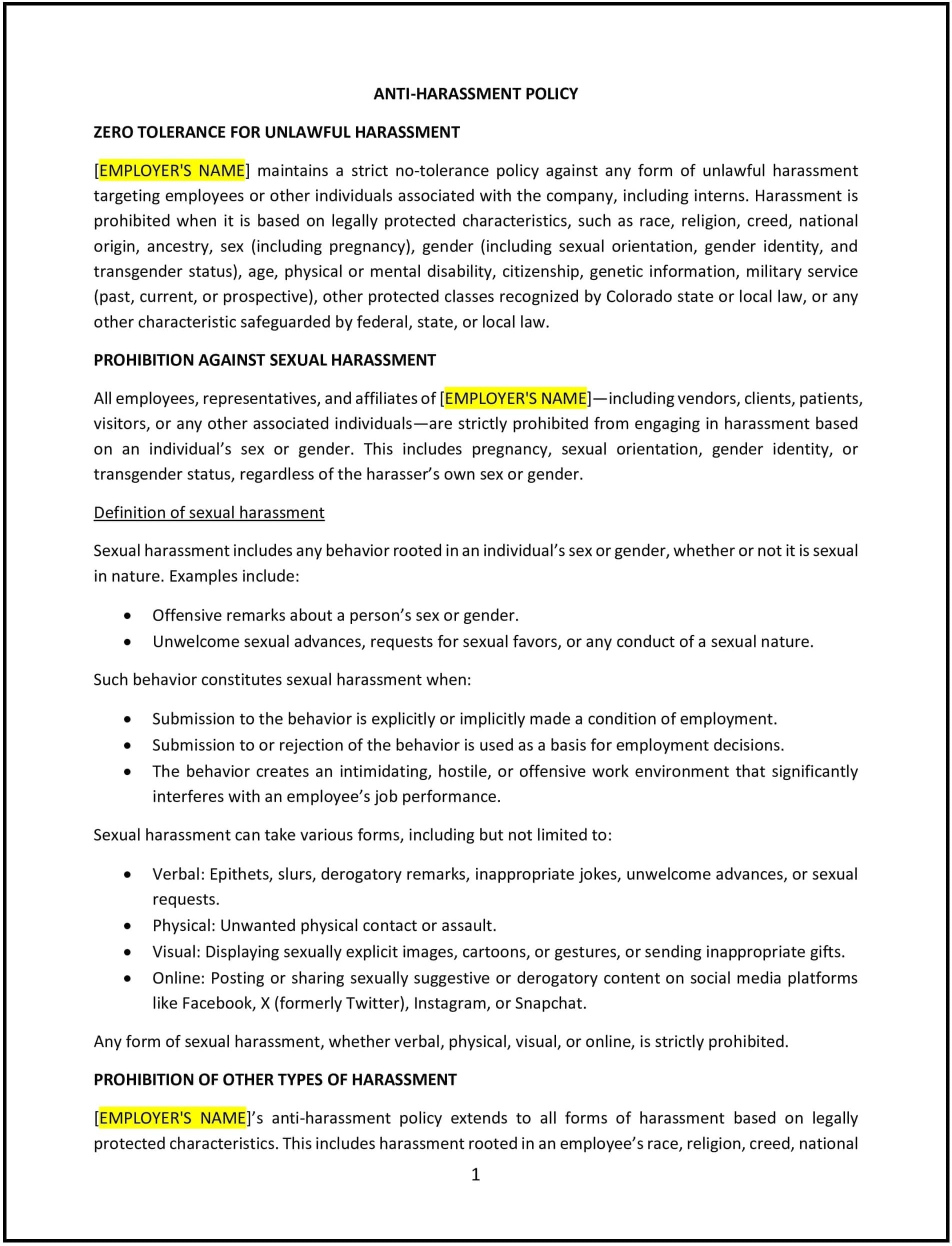Got contracts to review? While you're here for policies, let Cobrief make contract review effortless—start your free review now.

Customize this template for free
Anti-harassment policy (Colorado)
In Colorado, an anti-harassment policy provides businesses with guidelines for preventing and addressing harassment in the workplace. This policy aligns with Colorado’s anti-discrimination and harassment laws, including the Colorado Anti-Discrimination Act (CADA), and federal regulations such as Title VII of the Civil Rights Act of 1964. The policy outlines the business’s commitment to providing a respectful and inclusive work environment, free from harassment based on race, gender, sexual orientation, disability, and other protected characteristics.
This policy ensures that employees are aware of their rights and the business’s expectations regarding harassment prevention, reporting, and resolution. By implementing this policy, Colorado businesses can create a culture of respect and accountability while minimizing the risk of legal claims related to harassment.
How to use this anti-harassment policy (Colorado)
- Define harassment: Clearly define what constitutes harassment, including verbal, physical, or visual conduct based on protected characteristics such as race, sex, religion, disability, and others.
- Communicate reporting procedures: Provide employees with clear and confidential reporting procedures, including who to contact, how to submit complaints, and what happens after a report is made.
- Establish response protocols: Detail the steps the business will take when a harassment complaint is received, including investigation procedures, timelines, and potential consequences for perpetrators.
- Promote prevention: Offer regular training to employees and managers on how to recognize, prevent, and respond to harassment, including bystander intervention and maintaining a harassment-free environment.
- Ensure non-retaliation: Clearly state that employees will not face retaliation for reporting harassment, and ensure there are mechanisms to protect whistleblowers.
Benefits of using this anti-harassment policy (Colorado)
This policy offers several advantages for Colorado businesses:
- Supports compliance: Ensures adherence to Colorado and federal anti-discrimination and harassment laws, reducing the risk of legal action or penalties.
- Promotes a respectful work environment: Fosters a positive workplace culture where employees feel valued, respected, and included.
- Reduces risks: Minimizes the likelihood of harassment claims, reputational damage, and financial costs associated with workplace harassment.
- Enhances employee morale: By providing clear expectations and support, the policy helps employees feel safe and confident in their work environment.
- Builds trust: Demonstrates the business’s commitment to employee well-being and legal compliance, which can strengthen relationships with staff and stakeholders.
Tips for using this anti-harassment policy (Colorado)
- Reflect Colorado-specific laws: Ensure the policy aligns with Colorado’s specific anti-discrimination and anti-harassment laws, including the Colorado Anti-Discrimination Act (CADA).
- Offer regular training: Provide mandatory training for employees and managers to raise awareness and ensure they understand their roles in preventing and addressing harassment.
- Create a safe reporting system: Implement anonymous and accessible reporting channels to encourage employees to come forward without fear of retaliation.
- Monitor compliance: Regularly evaluate the policy’s effectiveness and ensure that harassment complaints are handled promptly and fairly.
- Review regularly: Update the policy periodically to reflect changes in Colorado laws, industry best practices, and business needs.